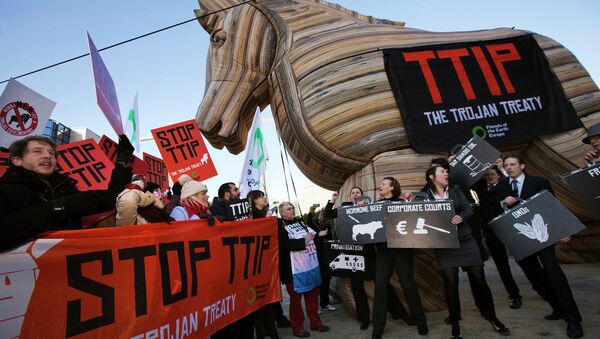In an open letter to MEPs, the groups, which include trade unions, environmental groups and civil rights organisations from 25 different countries, have warned that any potential TTIP could lead to the increased influence of big business at the expense of public services and workers' rights.
Instead of calling for the abolishment of any such agreement between Europe and the US altogether, the letter instead calls for "a TTIP resolution that puts people, the environment and democracy before short-term profit and disproportionate corporate rights."
There has been widespread concern throughout Europe about what impacts any potential TTIP may have on citizens due to the secretive nature of negotiations and discussions between American and European negotiators.
It is thought that negotiations are working towards the removal of export tariffs, essentially creating the largest bi-lateral free trade zone in history.
Critics say any such developments would favour businesses over governments, and could even potentially give multinational corporations the opportunity to sue governments if they are seen to intervene in trade deals.
Meeting parliamentarians and representatives of civil society in Luxembourg, discussing #TTIP /JL pic.twitter.com/2DXU8BoRjr
— Cecilia Malmström (@MalmstromEU) February 26, 2015
It's also believed that it may also lead to a reduction in public safety and health standards, as controls and protocols are simplified.
The secrecy of discussions is one of the key issues for opposition groups, with the 375-strong group coalition calling for immediate transparency in relation to TTIP discussions, in order to facilitate an "open and critical public debate."
Corporate Coup d'Etat
Pia Eberhardt, from lobby-watchdog Corporate Europe Observatory, said that any such agreement would seemingly benefit private companies and weaken public services.
"TTIP is an attempted corporate coup d'etat where big business on both sides of the Atlantic is trying to achieve in secret negotiations what it could not get in open and democratic processes — from watering down food safety standards to rolling back regulations in the financial sector."
There are also fears that any deal could lead to as many as one million jobs moving to the US, where trade unions generally have less rights compared to Europe.
Hungary's deputy prime minister signs 1.5m citizen petition to #StopTTIP https://t.co/iauIFql7aA #TTIP @mtvsz pic.twitter.com/6dUUbXpHbI
— Friends of the Earth (@foeeurope) February 26, 2015
Erich Foglar of the Austrian Trade Union Federation (ÖGB) said: "Trade unions will not support trade deals that lead to job losses, increase inequalities and undermine democracy. But the negotiation texts and independent studies we see, show that this is exactly what TTIP is about.
"What we need is a trade policy which respects democracy, helps generate decent jobs and enhances workers' rights."
The public opposition comes as European Parliament committees discuss a draft resolution on TTIP negotiations, which are to be voted upon in May.
I'd like my next MP to oppose the #TTIP trade deal. Will you protect our public services and stand for people over big business?
— Medact (@Medact) March 3, 2015
This isn't the first time there has been opposition the proposals, with thousands of people across a number of European cities taking part in protests against the lack of transparency associated with TTIP negotiations.
Guy Taylor, a trade campaigner from UK-based activist group Global Justice Now, says that negotiators are ignoring "potentially disastrous" consequences for ordinary people in both the EU and US.
MEPs must protect public from EU-US trade deal threat http://t.co/zGRSijo1fr 375 groups write open letter to MEPs #TTIP #noTTIP
— Global Justice Now (@GlobalJusticeUK) March 3, 2015
"Food and environmental standards are at risk, and public services could be sacrificed as well. All this will be backed up by a secretive tribunal system, which extends corporate power and influence over our democracy.
"Members of the European Parliament must oppose TTIP at every turn if they wish to represent the interests of their constituents over the wealthy top 1% of society."
European Parliament will discuss key issues relating to TTIP, before voting on a draft resolution in May. Although this May vote isn't legally binding, it's seen as a litmus test for any potential deal, as this would have to pass through an MEPs' vote.



